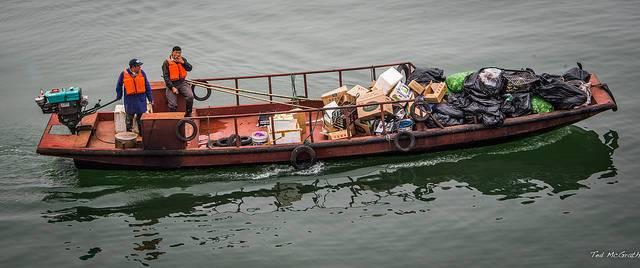
The logistics of how the world copes with its mounting waste were just thrown a wicked curve ball from the Pacific Rim. And the case for embracing a circular economy became stronger. Last week China announced that it would no longer accept many imports of garbage from other countries.
China recently informed the World Trade Organization (WTO) that wastes resulting from textiles and steelmaking are among a list of 24 types of garbage that will no longer be accepted at the country’s ports. In addition, waste plastic and paper are also no longer welcome.
“To protect China's environmental interests and people's health, we urgently adjust the imported solid wastes list, and forbid the import of solid wastes that are highly polluted,” the Chinese government wrote in a notification it sent to the WTO explaining the change in policy.
China’s readiness to accept this import from overseas helped build the country’s reputation as the world’s garbage collector. The massive waste diversion that sent ships across the Pacific with heaps of trash also made more than a few individuals rich. A decade ago, Zhang Yin, who recycled imported waste paper from the U.S. and churned it into packaging for China’s exports, was widely reported to be the country’s wealthiest citizen. China’s hunger for scrap material made plenty of other individuals millionaires, such as a waste metals dealer Adam Minter who was profiled in The Atlantic a few years ago.
Meanwhile, here in the U.S., opponents of U.S. trade policy could support their arguments by quoting the book Garbology by Edward Humes. In a 2012 interview with the Los Angeles Times promoting that book, Humes told a reporter:
“America's biggest export is trash -- the scrap paper and metal we throw away. The Chinese buy it, make products out of it, sell them back to us at enormous profit, and we turn it into trash again. America, the country that once made things for the world, is now China's trash compactor.”
But while China became the destination of much of the world’s unwanted waste, the world’s most populous country increasingly struggled with its own garbage problem. As mega-cities such as Beijing became even more crowded, available landfill space shrunk. Many civic leaders felt the only alternative was to build incineration plants, which certainly did not help the country’s overwhelming air pollution problem. “Provincial governments have decided that burning is the best way to deal with their trash,” wrote one Chinese correspondent in 2014 for the Australian Broadcasting Company. “Moreover, the smell is more easily dealt with than landfills.”
China is still coping with the environmental wreckage from its role as the world’s factory for over a generation. And the country’s leadership has realized over the past several years that the country’s relentless development has come with a high cost at many levels. Hence the country is undergoing a “green revolution,” and is embracing new clean technologies, a shift unthinkable just a few years ago. “After the global financial crisis, Chinese leaders recognized that the industry- and export-driven economic model that had delivered growth rates above 10 percent per year was unsustainable in the long run,” said Keith Johnson in a 2015 article for Foreign Policy.
Of course, saving face has its fair share within Chinese culture, business and diplomacy. Beset by its own environmental challenges, the country’s leadership has clearly grown tired of the world taking China for granted as a place to dump unwanted and untreatable waste. “We found that large amounts of dirty wastes or even hazardous wastes are mixed in the solid waste that can be used as raw materials. This polluted China's environment seriously,” concluded Chinese trade officials in a terse statement filed last week with the WTO.
Image credit: Ted McGrath/Flickr

Leon Kaye has written for 3p since 2010 and become executive editor in 2018. His previous work includes writing for the Guardian as well as other online and print publications. In addition, he's worked in sales executive roles within technology and financial research companies, as well as for a public relations firm, for which he consulted with one of the globe’s leading sustainability initiatives. Currently living in Central California, he’s traveled to 70-plus countries and has lived and worked in South Korea, the United Arab Emirates and Uruguay.
Leon’s an alum of Fresno State, the University of Maryland, Baltimore County and the University of Southern California's Marshall Business School. He enjoys traveling abroad as well as exploring California’s Central Coast and the Sierra Nevadas.














